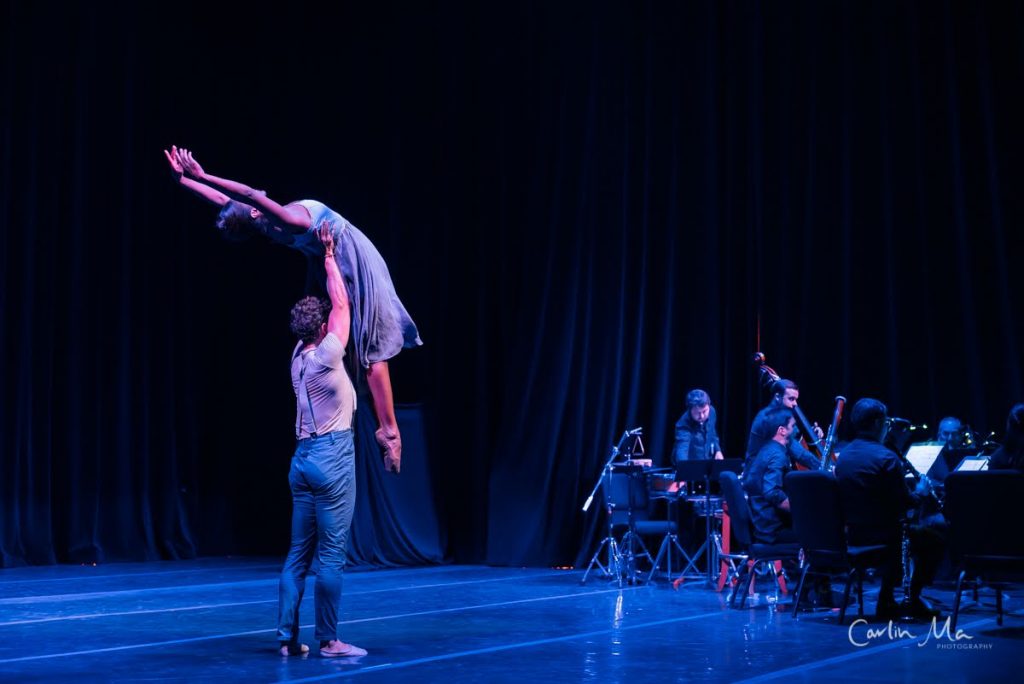By Philippa Kiraly, Special to The Sybaritic Singer
Photo credit: Carlin Ma (used with permission)
A new tale of a soldier told in dance and music, plus another from a century ago, told the same way: These were the opening works of Emerald City Music’s fourth season, which began Friday night in the one-time venue of Tagney-Jones Hall at Seattle Opera Center. The whole was a smash hit, the place sold out (despite uncomfortable bleacher seating, badly designed for most older adults), the applause vociferous, and the stage space excellent for a small dance presentation and a group of chamber musicians.
The two works were the world premiere of local composer Angelique Poteat’s Her Story of a Soldier, commissioned by the Lynn and Brian Grant family, and a retelling of Stravinsky’s L’histoire du soldat (The Soldier’s Tale) which premiered in Lausanne, Switzerland almost exactly 101 years ago, September 28, 1918.
The Poteat work came first. Musically, it’s clear that the composer intentionally used the Stravinsky as a model. The style she uses here successfully has the same kind of quirky, rhythmic energy and much the same kind of harmonic vocabulary, while the instrumentation is almost the same: violin, clarinet, trombone, double bass, and percussion.
Poteat, who was present, has planned the work in four movements, titled, respectively, “Your Country Wants you…Maybe,” “Gemini,” “On the Same Team?” and “Not Bad for a Girl.” The tale, as was described beforehand in a video, is of a young woman who eagerly joins the military guided by a dubious recruiter, battling stereotypical behavior by her military colleagues while trying hard to succeed, coping with sexual advances by an otherwise supportive soldier, and eventually finding her place.
Two dancers portray the story: choreographer/dancer Michael O’Neal representing male soldiers, Angel Alviar the young woman. However, the choreography is insufficiently varied and does not delineate clearly what is going on. The movements, while beautifully executed, do not differentiate the intentions of the recruiter at the start or the male colleagues or the supportive soldier, nor the changing feelings, efforts, and emotions of the young woman. The only really clear-to-observe part is the failed seduction and the young woman’s finding her place towards the end. It would have been a big help to have a spoken narrative to tie it all together, as in the Stravinsky. As is, this is still a work in progress.
In contrast, The Soldier’s Tale, Retold is a triumphant success. In this new arrangement, co-commissioned this year by EMC and Moab Music Festival, the music is unchanged, with the same musicians as in the Poteat plus trumpet. The chamber group is led by Michael Barrett as conductor and EMC co-founder Kristin Lee on violin. The difference is a new narrative by Mark Campbell (recently librettist for The (R)Evolution of Steve Jobs), who has set the tale in post-Civil War days but otherwise follows the original closely; and having that libretto spoken by the dancers as they perform.
This brilliant solution ties the story neatly to the action and makes perfect sense. It does mean that the performers have to be as good actors and speakers as they are dancers and this was achieved with compelling presence by David Prottas from New York City Ballet as the Soldier, Ashley Fitzgerald as Mr. Scratch the Devil, and Taeler Cyrus as Clara, the Princess, both these latter two with extensive New York and Broadway credits. Imaginative choreography by Joshua Bergasse (On the Town, Charlie and the Chocolate Factory), matched by the acting skills of the performers, particularly the main protagonist, Prottas, kept the audience absorbed. Lighting was simple but effective, wings provided just by a couple of screens either side at the back.
It all made for a notable performance, an impressive start for EMC’s fourth season, which reverts next month to its usual Seattle venue, Kakao coffee house at 415 Westlake.

Philippa Kiraly has writing classical music criticism since 1980, for several newspapers in northern Ohio and Seattle, magazines, both local and national, and blogs. She is passionate about the importance of independent criticism for the fine arts, an art in itself which is dying with little interest by many publications and no longer a viable career for most. But writing for tickets is always worthwhile!
Pippa is a keen gardener, a keen grandparent, and can get lost in a good book.

